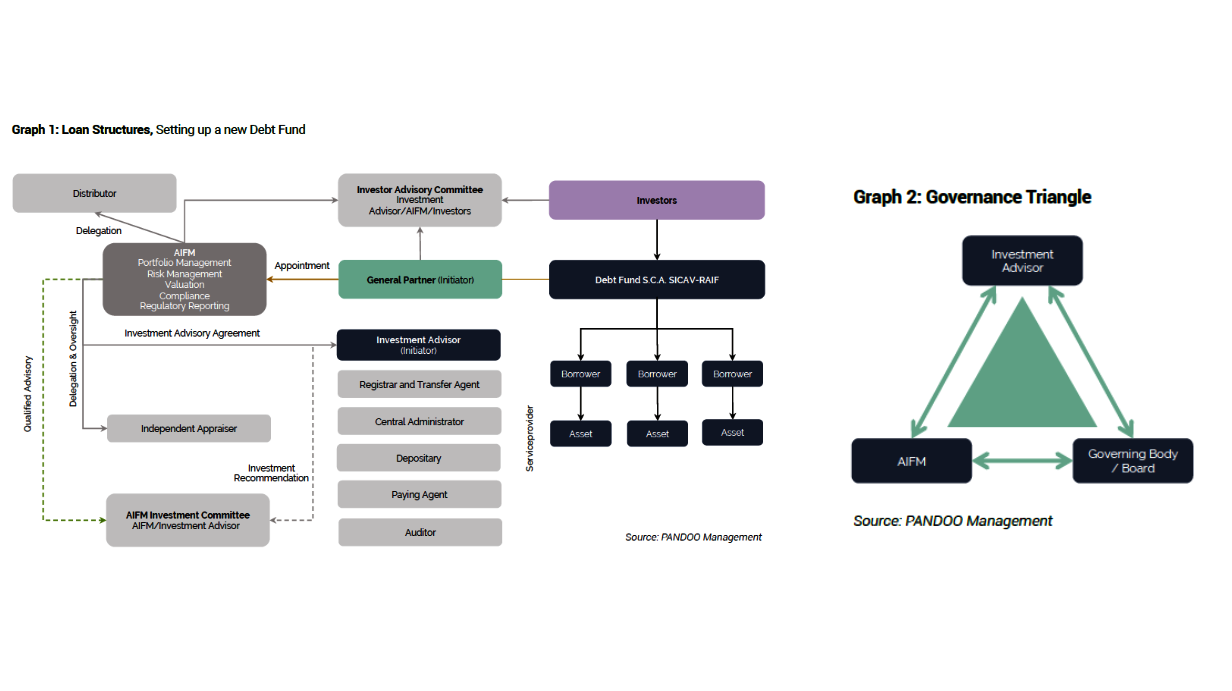
The benefits of having a Service AIFM when managing real estate debt funds
Autor
Johannes Reis

Blogbeitrag
The benefits of having a Service AIFM when managing real estate debt funds
Alternative investment strategies like real estate funds are currently experiencing a slowdown in investment transactions. The market struggles with occasional financial difficulties faced by construction companies, developers, and borrowers and requires intensive asset management and restructuring work. Additionally, fluctuating interest rates and general economic uncertainty have put alternative investment strategies into a challenging market environment. These restructuring obstacles on the underlying real estate assets significantly impact the management of these funds.
Opportunities in a challenging environment
Investment Advisors (“IA”) and other service providers (graph 1) that can navigate these challenges could potentially unlock attractive opportunities for real estate debt funds in the future. The Alternative Investment Fund Manager (“AIFM”) plays a critical role in the management of real estate debt funds. The core functions of the AIFM encompass Portfolio Management (“PM”), Risk Management (“RM”), and Valuation. Reliable, robust, and thorough governance processes in cooperation with the IA and the Governing Body (“GB”) of the fund are crucial for successfully managing these funds in the current market. What are the key tasks of these core functions, and what governance elements are needed to manage the funds successfully amid current uncertainties?
The PM function acts as the main driver for governance elements, with the investment approval process as a pivotal task. The interaction between the IA, who recommends the investments to the AIFM, and the execution of the transaction by the GB of the fund are key elements for a successful investment process. The organization of this cooperation should be formalized via an AIFM Investment Committee (“IC”) which analyzes and approves the investment transaction. Checking the investment eligibility, the investment restrictions, and the borrower’s AML/KYC are some agenda items for the IC.
In addition to the AIFM IC, it is advisable to establish an Investor Advisory Committee to keep investors informed about current developments, investment opportunities, fund performance, and future outlook. It is important to note that this forum can only act as a consulting body to the IA and the AIFM, as the ultimate responsibility for the investment approval remains with the PM function of the AIFM
In-depth analysis and risk assessment as a basis
When launching a real estate debt fund product, the RM function of the AIFM will perform an in-depth product analysis, develop a risk matrix, and create an RM policy. The operational workstream includes regular risk monitoring, oversight of service providers, and the production of regular RM reports. These reports should include the initial risk rating on all risk categories, the ongoing calculation of risk indicators, portfolio analysis, and investment compliance monitoring.
The Valuation function of the AIFM is responsible for ensuring a proper and independent valuation of the underlying real estate assets of each debt fund in accordance with legal and regulatory requirements and the fund’s prospectus. It is also the obligation of the AIFM to ensure that appropriate and consistent valuation procedures are established. The selection of the independent appraisers and monitoring of their performance is also an important responsibility of the Valuation function.
Choosing the right service providers is key to success
Success in launching a real estate debt fund product starts with an appropriate setup and selecting the right service providers who are experts in this specific asset class. It can be concluded that in analogy to the well-known concept of the “investment triangle”, a similar cooperation concept, the “governance triangle” (graph 2), between the AIFM, the IA, and the GB of the fund is essential. The existence of such an appropriate governance concept is a key differentiator for real estate debt fund managers. These managers will be able to benefit from restructuring opportunities, which can provide sustainable and attractive riskadjusted returns
Copyright Headerbild: AdobeStock_630345037

This article was published as part of the DEBT SPECIAL 2023.
weitere Informationen
Werden Sie FondsNews-Leser!
Fachartikel, Informationen und Nachrichten der institutionellen Immobilienwirtschaft.